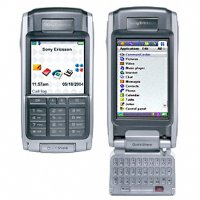« Home | Blog Failure Rates »
Smart Phones for New Ratings Collection
 The digtal world continues to converge around the cellphone. MobileESPN, videoporn, radio broadcastings and podcasts...it's all centralizing onto the cellphone, a place where mp3s, day planners, emails, web surfing and games have already been accepted. The advertising world is adapting how it figures out usage ratings so that it can sell better. It looks like a new SmartPhone could be one of the answers.
The digtal world continues to converge around the cellphone. MobileESPN, videoporn, radio broadcastings and podcasts...it's all centralizing onto the cellphone, a place where mp3s, day planners, emails, web surfing and games have already been accepted. The advertising world is adapting how it figures out usage ratings so that it can sell better. It looks like a new SmartPhone could be one of the answers.
One of the benefits of strategic consulting is the privilege to explore innovative thinking and help clients think outside of the proverbial box. One such conversation I had took place in September 2004 with Arbitron's personal people meter (PPM) lead maven (I'll keep him unnamed here since it was a private conversation), who later became a leader for the Arbitron/Nielsen collaboration called the "Apollo Project".
This project is designed to take ratings systems out of the dinosaur analog/diarykeeping days and into today's digital reality to measure the impact and reach of all forms of modern advertising. Radio, TV, Internet and more.
At the time (and still today), Arbitron had been trying to convert media and advertising companies to accept the PPM. Test have been conducted in select markets. However, many companies have balked at the new technology, fearing dramatically different ratings measurements rather than the ratings system they have traditionally sold for decades.
In my casual conversation with Arbitron, I shared my thoughts and recommendations. Among them:
1) Consider this transition as a "system software platform change", such as Windows does when it goes from 98 to XP to the upcoming Vista or when Apple goes from OS 9 to OS. It makes the old system relatively obsolete and forces new application use. In essence, it becomes a new gold standard. PPM (or Apollo) needs to become a new gold standard.
2) Drop the PPM gadget development concept and think cellphones and SIM card development. Instead of building new gadgets (in which Arbitron had zero history), shift instead to customizing cellphones through SIM cards and/or similar thinking. With all the modern gadgets people carry around (cells, blackberries/Treos, pagers, iPods, etc.), no one wants to carry around yet another gadget designed only to measure ratings which require special uploading cradles to send the data home to Arbitron or Nielsen. Certainly not for $5.
It seems Arbitron didn't heed my recommendations.
A month later (October 2004), the Apollo Project partnership between Arbitron and Nielsen was announced. Basically, the announcement did not generate much excitement at all. In fact, many vocal opponents heavily criticized it. And it still hasn't been embraced by the industry. All it seemed to be was an extension of the reviled PPM device.
About 9 months later (Spring 2005), Clear Channel announced an idea competition, hoping to find a better alternative than the PPM or the "Apollo Project". 34 firms submitted their ideas and by December 2005, Clear Channel said they had narrowed their finalists to just a few companies. The consistent theme: the new digital measuring device would be handled by common consumer cellphones adapted for ratings collection.
Glad someone agreed.
Think about it: what other other devices is carried by people gladly everywhere they go? The only other gadget that might be kept with a person more might be a wristwatch. But creating adaptive software technology for a watch is much more difficult. For a cellphone, it is realtively easy.
So today, one of the seven Clear Channel competition finalists (a partnership between IPSOS and Media Audit) announced that their new technology for collecting ratings data has passed a major test, being validated by the official British ratings service (called RAJAR). US testing of the technology begins in the next few months.
As you'd imagine, Arbitron/Nielsen want to protect their technology (and their investment). They made their bet with PPMs a long time ago. What do they think of this concept from IPSOS/Media Audit? According to a quote in MediaWeek.com, John Snyder, VP of PPM sales for Arbitron says “Smart phones won’t just monitor radio listening, they will help a survey respondent replace radio listening with a long list of alternative audio media. As a result, any smart phone ratings sytem will artificially inflate the number of ‘early adopters’ in a radio ratings survey. The results could be devastating for radio. It would be like Arbitron giving a free iPod to every one of our diarykeepers.”
This battle will be interesting to watch in 2006.
If this Clear Channel competition can create something truly innovative, forcing the rating companies to change gears away from PPM (and all the millions of $$$ they have spent in development) and toward this new "SmartPhone" concept, that would be a major accomplishment. It would show Clear Channel's influence is driven not just by size but also by its ability to create innovation.
Now that would be something.
related MediaWeek article here
posted by Unknown @ Tuesday, February 21, 2006,
![]()
![]()















